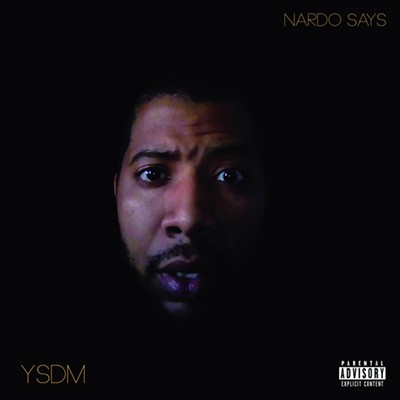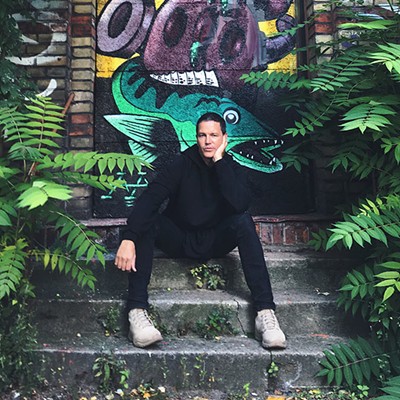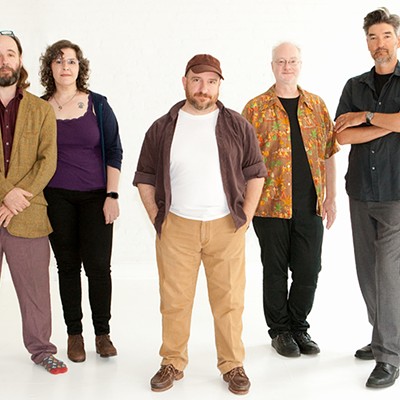Tuesday, January 14, 2014
Winter JazzFest NYC recap
“Over 90 artists on 10 stages,” the program claims, and they weren’t kidding. “They” in this case were the organizers of Winter JazzFest, a five-day festival in New York which marked its 10th anniversary last week. The lineup was mind-boggling, going from the more traditional and straight ahead to a plethora of acts that push the envelope in ways that abandoned tradition like an L subway train heading to Brooklyn.
To a Pittsburgh jazz enthusiast, the constant club hopping can be exhilarating. It also brings with it a feeling of envy. Why doesn’t guitarist Nels Cline bring his non-Wilco projects here? Would drummer Ches Smith draw an audience in Pittsburgh for his trio with violist Mat Maneri and ECM pianist Craig Taborn?
When Mary Halvorson came to Pittsburgh in 2008, she was a member of Anthony Braxton’s ensemble with just a few releases to her own name. Today the guitarist has three critically lauded albums with her own group, which has grown incrementally from a trio to a septet. Getting this group together is a major undertaking, since every member is a leader in their own right. Two of them were coming to their Judson Church performance from other gigs too. (Ches Smith left immediately after for a set at another club.) While the high-ceiling church made for cavernous wash of sounds, sitting in the upper balcony provided sonic clarity. Halvorson, sitting with her hollow-body guitar held close, blended gentle melodies with full-on skronk, bent notes and the occasional power chord, most notably in the new, unofficially titled "#49."
German saxophonist Peter Brötzmann followed the Halvorson group. Known for his gale-force exhortations on tenor and clarinet, his performance had more dynamic range thanks to his co-horts. Drummer Hamid Drake has been a longtime Brötzmann bandmate, but Chicago vibraphonist Jason Adasiewicz is relatively new. His combination of dreamy sustain and visceral pummeling (his four mallets made his look like a puppeteer as his maneuvered over his instrument) gave the 45-minute set some contour that made sure it was more than free blowing.
Later that night at the Bitter End, trumpeter Ben Holmes lead a quartet that kept things in a more melodic territory, still offering plenty of energy, especially from drummer Vinnie Sperazza and bassist Matt Pavolka. As the evening got later, Thiefs took the stage for a set that combined trance, r&b and free moments. Drummer Guillermo H. Brown (who once played with the late free saxophonist David S. Ware) used triggers and a trap kit, while saxophonist Christophe Panzani ran his horn through effects that rivaled Halvorson’s set and bassist Keith Witty held down the steady riffs. While the band’s energy was infectious, a chord change or a little more brevity would have helped.
By Saturday evening, the Polar Vortex was a distant memory, with a steady rain being the only connection to it. Subculture, true to its name a basement venue that resembles a theater space more than a jazz venue, offered one of the choice spots of the evening. Darcy James Argue’s Secret Society is an 18-piece ensemble exploiting rich sonorities of brass and reeds, using it for thoughtful compositions that still maintain a jazz edge. The blues are still at arm’s length and soloists like trumpeter Ingrid Jensen add to it.
Trumpeter Ralph Alessi already several albums to his credit as a leader before ECM released his exquisite Baida album last year. His set, which drew from the album, was marked by the ability to create suspense at low volume. "In-flight Entertainment" seemed to build to a climax, only to reshape itself into something else — and the band did that twice in the tune. At the end of the set, right when everything seemed to point to a final crash, the quartet stopped and Alessi emitted some tiny notes, saying more than he would have had he just wailed.
An eight-block run seems necessary if there’s a chance to catch visionary composer/reedist Henry Threadgill. Tonight he served as conductor in for an extended piece titled "Old Locks and Irregular Verbs," dedicated to the late Lawrence "Butch" Morris, who pioneered the art of conduction, a combination of improvisation and conducting. Like much of Threadgill’s work "Old Locks" was dense, with alto saxophone solos swirling over accompaniment of tuba, cello and two pianos (Jason Moran and David Virelles). Yet when Threadgill’s raised hands lead to a high-pitched climax, everything that lead up to it made sense.
In the mid-‘90s, saxophonist Tim Berne visited Pittsburgh on a few occasions, most notably with his high-energy quartet Bloodcount. These days, he is also part of the ECM roster, in the band Snake Oil with pianist Matt Mitchell, clarinetist Oscar Noriega and, once again, drummer Ches Smith, who was probably the busiest player in the festival. Berne’s latest has a similar melodic range to his earlier work, though things don’t always get as frenzied. Back at Subculture (yes, I ran back after Threadgill), the group was firing on all cylinders. Berne, the master of wry introductions, announced that his first four pieces were all different named “Lame” with a different “part” to their title, and judging from the similar beginning of each one, it made sense. But what really matters with Snake Oil is what happens after things take off, and whether Smith is incorporating gongs and woodblocks, Mitchell is hammering or caressing the keys or if Noreiga plays bass clarinet or standard B-flat. All of the above happened in their set.
Along with jazz-inspired poet Amiri Baraka, the world also lost trumpeter Roy Campbell, Jr. last week when he died suddenly. (Cause of death has not been released at press time.) A gifted, versatile musician, he played with several of the performers at Winter JazzFest. Guitarist Marc Ribot dedicated his set with the band Ceramic Dog to him late Saturday night back at Judson. With Halvorson providing a foil for Ribot — who could really handle things well on his own — the quartet shredded for 45 minutes going from spaghetti western music to, believe it or not, indie rock. Some of it veered dangerously close to jam rock, but Ribot never fell into that abyss.
Pianist Matthew Shipp, no stranger to Pittsburgh avant jazz fans, was a close associate of Campbell, and he too dedicated his set to his friend. Perhaps knowing that paints my impression of Shipp’s set, but there were moments when it felt like the pianist was expressing his grief and love through music, brutally pounding on the keys creating his trademark thunder, moving on to gentle melodies. Tired as I was at the trio’s 2:00 am finish, the heavy closing notes of Michael Bisio’s bowed bass and Shipp’s piano proved to be perfect ending of a tremendous weekend.
Tags: FFW>>













